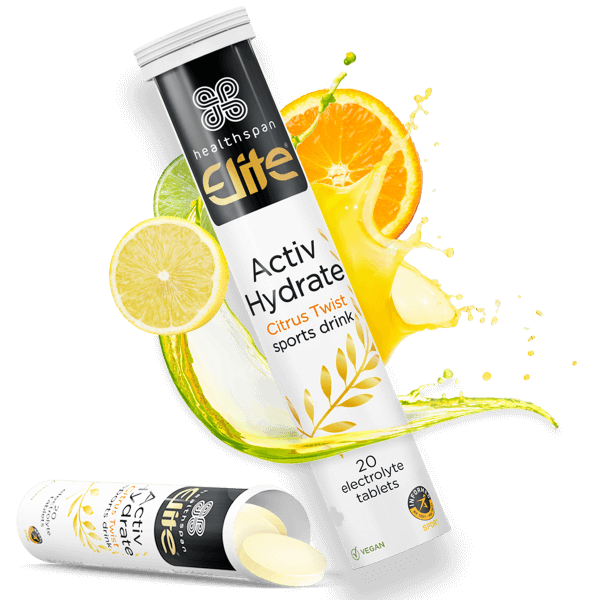The variety of available events has made long-distance cycling accessible to everyone, whatever their ability or fitness level. Whether cycling through Europe or embarking on your first road race, getting your food intake right will give you the stamina and energy you need for training and race day.
🕒 5 min read
Diet basics
There are several things to consider in the run-up to the event. First, if your body is not adequately fuelled, you may struggle to find the energy needed to get you to the finish line.
Second, maintaining a nutritious diet will supply your body with the nutrients required for recovery and other functions such as immunity, which will help you maintain your fitness as the event approaches. Hydration is also crucial.
The steps below will help you define a diet and hydration strategy to follow in the build-up and during the event.
1. Load up on carbs
Carbohydrate is the primary fuel source for endurance events, but the body has a limited capacity to store it as glycogen in muscles and the liver. You can maximise these stores by increasing your carbohydrate intake a few days before the event. This doesn't mean eating more food overall – just readjusting your carbohydrate serving size compared to protein and fat.
- Brown rice
- Wholemeal pasta
- Bread
- Couscous
- Potatoes
You may want to swap these foods for white varieties the day before the event, if you find they're causing bloating or other gut discomfort.
Finally, resting in the days leading up to your event can help to preserve glycogen stored in the body.
2. Event day fuelling
The food you eat on the day of your event is an excellent way to top up the glycogen stores in your liver. Aim to eat 3-4 hours before you start cycling, and choose something nutritious that is high in carbohydrates – but low in fibre and fat to help aid digestion. You may also want to eat a smaller snack 1-2 hours before you start.
- Porridge with fruit (berries, banana)
- Scrambled egg on white toast
- Weetabix with fruit
- White Rice or pasta dish
- Roll or sandwich with light fillings such as ham or banana
- Baked potato
- Creamed rice
- Crumpet or white toast with jam
- Sports drink
- Energy gel (60 mins before race)
- Fruit smoothie
- Yoghurt with banana
- Muesli bar and fruit
If you are nervous before the race, you may find it easier to stick to liquids (sports drinks, smoothies) and fruit rather than solids.
3. Stay hydrated
Aim to start the day in a balanced hydration state: you can judge this by the colour of your pee, which should run clear. If your pee is dark and you're dehydrated, sip water regularly in the time leading up to the race. Sipping water is better than guzzling, which will have you back and forth to the bathroom.

Activ Hydrate
Delicious fruit-flavoured electrolyte drink to replenish minerals lost during exercise
- Replenishes the essential electrolytes sodium, calcium, magnesium and potassium
- Contains 300mg sodium
- Informed Sport-accredited
4. Fuel on the bike
It's important to replenish your glycogen stores regularly to have enough energy to go the distance. Events lasting between 90 minutes and 2.5 hours will require 60g carbohydrate per hour (around 2 energy gels) to help prevent muscle fatigue and maintain performance.
You can prepare a sports drink or consume sports gels to get the necessary carbohydrates when on your bike, but make sure you test them before race day, as they can cause gut upset in some people.
You may prefer solid foods such as bananas, jam sandwiches, fruit cake or malt loaf, but these can be a little trickier to eat when cycling.

Energy Gel – Mixed Pack
Carb and electrolyte boost developed with British Cycling
- Delivers fast-acting energy
- 25g fast-acting carbs and 3 electrolytes
- Apple & Blackcurrant, Citrus Fruit and Passion Fruit flavours
5. Listen to your body
It's vital to pace yourself during your first long-distance race, and to listen to your body. Pushing too hard at the beginning of the race can deplete your energy stores. By contrast, a steady pace can help you manage your on-bike fuelling more effectively.
Understand your hunger cues to know when to refuel during the race, and avoid becoming completely depleted before taking on more food.
6. Don't forget recovery
Nutrition is still a priority once you finish your event, as it's important for recovery. Aim to eat a snack or small meal containing carbohydrates and protein as soon as possible, as this will help replenish your glycogen stores and aid muscle recovery.
This could be something simple like a chocolate milk drink or a protein shake with added carbohydrates (the weight gain variety.)
After completing your long-distance bike ride, prioritise recovery nutrition. Consume a meal or snack containing carbohydrates and protein within 30-60 minutes of finishing your ride. This will aid in muscle repair and glycogen replenishment.
Within two hours, aim to eat a balanced meal with lean proteins, whole grains, and vegetables; spaghetti Bolognese or chilli with rice are good examples.
7. Keep it simple
Fuelling your first long-distance race doesn't need to be complicated. Just think about the meals and snacks you need before, during and after the event to keep you adequately fuelled and to help your body to repair afterwards. With this plan in place you'll be able to approach the event with the confidence that you'll make it fine to the finish.








